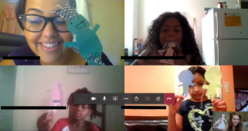New Jersey has faced so many challenges as a state as we weather COVID-19 and its wide-ranging impact. IRC in NJ’s youth program is no exception. Undaunted, IRC’s Refugee Youth Summer Academy (RYSA) adapted to safety precautions and deepened need with innovative strategies, strengthened partnerships, and unwavering resolve to prepare students for what will certainly be an unpredictable school year.
IRC worked closely with Elizabeth Public Schools in designing program adaptations to keep RYSA students and staff safe this summer. These close consultations are the product of IRC’s youth program’s strong advocacy for newly arrived students and strong collaboration with Elizabeth Public Schools’ dedicated staff.

This also helps define RYSA programming to be as meaningful as possible in preparing newly arrived students for their new schools as well as familiarizing school staff with the unique educational histories, strengths and growth areas IRC students present each year.
To keep students and staff alike, IRC began preparing for a virtual RYSA in the late spring. RYSA decided to use Microsoft Teams as the virtual learning platform, as that is the same platform used by Elizabeth Public Schools during remote learning. RYSA staff spent many weeks leading up to the program training families and teachers to use the technology.
RYSA enrolled 70 students ages 4-19, all of whom arrived to the U.S. in 2019 or 2020. The majority of RYSA students were from Afghanistan, Democratic Republic of Congo, and Colombia, with smaller numbers from other countries including Sudan, Syria, El Salvador, Guatemala, and Ivory Coast. As in previous RYSAs, students were sorted across six classes, ranging from kindergarteners to high school seniors. Classes operated from 9am-2pm daily and each student in grades 2-12 received one hour of ESL in the morning and one hour of enrichment activities in the afternoon. K-1 students received a customized learning plan with developmentally appropriate resources. Families were called with native language interpretation to explain how and when to use the learning materials. At times, phone calls were also used to complete read alouds with the students. Students were sorted into small groups based on age and language. RYSA featured 4 Dari/English classes, 4 Swahili/English classes, 1 Arabic/English class, and 2 Spanish/English classes. Each classroom included a lead ESL-certified teacher (many of whom returned from previous summers), volunteer teaching assistant, and interpreter to provide support.
Classes incorporated literacy, arts enrichment and social emotional development through trauma-informed program delivery methods. Teachers strove to plan interdisciplinary lessons to maximize the use of limited instructional time and the many needs of students. Learning goals for this summer included: familiarizing students with health and safety procedures to protect themselves against Covid-19, sharing a foundational understanding of social justice issues as they relate to student experiences and recent events, building student abilities in technology and computer literacy, development of social emotional learning, and supporting English language growth.
Online learning certainly presents challenges, but that did not stop RYSA staff from incorporating movement and physical education in 2020. Virtual yoga and dance classes helped students develop calming strategies, stretch their bodies, and burn off energy while staying safely at home.
IRC worked with families to ensure technology and broadband access when schools transitioned to remote services and have continued to support during the three weeks of RYSA. This effort has accelerated digital literacy’s incorporation across youth education services and curriculum.
To support IRC’s vital work for newly arrived children and youth through RYSA and year-round support, click here.